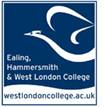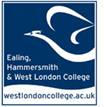Access keys
Search Skip navigation
Ealing Hammersmith and West London College
Year 3: Mobile Health Care 2009/2010

Project Description
Teachers will explore a range of pedagogical models and through their own interaction with mobile technologies radically remodel the learner/teacher experience. Teachers will complete a training programme which mirrors the pedagogical model to be used to deliver employability skills for Health and Social Care, Hair and Beauty courses run in the College, by NHS Trust and Edec Enterprise Centre. Teachers from the three centres and partners, will work collaboratively to deliver a range of employment related modules using mobile technologies and cloud computing to learners ranging from school pupils, those in formal education and the employed.
Aims
Ealing Hammersmith and west London College (EHWLC), EDEC and Imperial College Healthcare NHS Trust (ICHT) aim to work collaboratively in order to develop a flexible delivery model responsive to shifting working patterns. Throught the use of mobile digital devices deliver, in a unique and innovative way, relevant and meaningful employability skills including literacy and numeracy, to learners in formal education, on work experience and those seeking progression routes within NHS. We will develop a cross institutional collaborative delivery model that is not dependant on any particular learning platform. Sustainability will be embedded through the development of a network of m-practitioners.
Objectives
Last year EHWLC successfully ran a Molenet 2 project ‘Making the foundation tier mobile’ which has vastly increased our mobile learning expertise and has identified the next stage of development required to help us reach our ambitious target of delivering 30% of the curriculum via a blended learning model by 2012. Effective use of mobile digital devices will play a crucial and essential part in achieving this goal. In a recent survey 100% of managers and 98% of teaching staff said the use of technology was essential for them to carry out their roles effectively.
From this strong foundation, the project will develop pedagogical practices that exploit the transformational possibilities of mobile learning rather than emulate established teaching methodologies and practices. Our partners have considerably less experience in using mobile technologies to support learners and the college is very keen to share its knowledge and resources in order to develop stronger links with the wider community. The establishment of a m-practitioners network throughout the borough and beyond, is a key objective of the project. The project builds upon our Molenet 2 project and is designed to overcome identified barriers to transforming curriculum delivery models which are now possible through using sustainable e-learning and mobile digital devices.
Many of the students on courses run by the 3 partner institutions lack employability skills which include literacy and numeracy. Past experience has shown us that teaching students these wider key skills in a traditional manner has limited impact on improving achievement, progression or employability skills. The project will develop the use of a range of mobile technologies to create a more innovative and responsive pedagogic model which exploits the full potential of digital technologies to enable collaborative and problem solving learning across the 3 partner institutions. This teaching model is not only very responsive and flexible but more accurately reflects the skills required in the real working environment. It is the ability to intervene and interact directly with individual learners in a responsive and meaningful manner through digital mobile devices that is the key to successfully transforming curriculum delivery models as well as personalising the learning journey.
Teaching staff will undertake a 12 hour on line development programme the outcomes of which will be to use the same on line model to deliver employability and literacy and numeracy skills to groups of students/employees from each of the partner institutions.
Through using a range of mobile technologies students will participate in a learning experience that more accurately reflects an authentic working environment. By participating in the project teaching staff will develop skills, knowledge and understanding that will enable them to not only transform their own curriculum delivery model but be a catalyst in supporting their whole organisation move to a sustainable transformational curriculum delivery model.
The Becta Generator tool will be used to test the impact of the Molenet project on all partners.
Target audience:
• Teachers/Trainers - work based learners - ‘Teaching with mobile technologies’ or ITQ in Mobile Learning
• BTEC First Diploma Course in Health & Social Care – 16-19 College Functional Communication/ Maths modules. L2
• Access to employment i.e. unemployed given conditional offers of employment for entry level applicants as part of Imperials Community recruitment programme(Learning for Work) Ranges from 16-65 - Functional Communication/ Maths modules L1
• NHS staff in post who need to achieve higher levels of Literacy and Numeracy to sustain employment. Work based - predominantly Nursing 30-40 age L2
• Diploma Hair & Beauty - WBL@The Ginger Group 14-16 Functional L1/2
Partners
Charing Cross Hospital and Edec Centre
Year 2: Making the foundation tier mobile 2008/2009

The project is producing evidence for a comparative analysis/study regarding what mobile technological devices best enhance student independent learning and achievement. By utilising various mobile technologies and setting learners key study tasks we will identify what works best for the Foundation Learning Tier cohort of students for progression to Level 2 and beyond.
Project Aims
The project aims to exploit the potential of mobile technologies to make a meaningful impact on the personalisation of learning for our Foundation Tier learners. Through the interaction with a range of mobile devices students will progress from a highly supportive Foundation environment to one where they have the confidence and skills to take ownership of their learning at a higher level. The project aims to allow teachers to explore a range of pedagogical models and through their own interaction with mobile technologies remodelled the learner / teacher experience.
Project Objectives
The majority of our Level 1 learners have very weak numerical and communication skills. By introducing a range of mobile devices we hope to engage and build up their confidence in these skills essential for progression to Level 2 and beyond. The devices will help us avoid replicating traditional classroom delivery models that were not successful at school. It is the expectation that their deep rooted aversion to maths and English will be mitigated by having their own personal learning devices to develop, extend and practice what they have been taught in college. We hope to acquire two class sets of each devices and rotate their use across 13 groups of students on a range of vocational courses at Entry level and level 1. The project will develop a cross department expert user groups made up of volunteer students whose role will be to support their peers and teachers.
Numeracy Achievement
The Nintendo console and software has a variety of calculation exercises based on multiplication tables. Alongside the console the student will also be given a MP3 player with the multiplication table so that they can learn in rote method as well. In addition to the student using the console independently, they can be used in the Key Skills AON lesson when micro teaching is taking place.
Capturing evidence
Video evidence is a way of capturing evidence which can inspire the learner. For example students are required to carry out customer service role plays. Using a video camera the students will record their role play to submit as criteria evidence.
Work Experience
60% of our cohort go out on work experience during their one year vocational course. Students are required to give feedback through a daily log which is often very weak. It is the intention of the project to introduce two mobile methods to capture their experiences - the ASUS umpc and Smart Phone. It is hoped that this non traditional method of developing communication skills will improve the quality of the feedback.
Projects
All of our vocational subjects require the students to carry out independent portfolio projects involving some research. Each student will be loaned their own ASUS to assist with this and to give them opportunities to work collaboratively outside of classes. Normal timetable will be adapted during this time to allow groups to work through daily online tasks keeping in touch with their e-mentors via a task twitter.
Tutorial eBooks Project
The majority of our learners are very reluctant readers and the expectation is that by introducing e-books they would be encourage to read for pleasure which would have a long term impact on their future engagement with reading.
Response systems
The students are encouraged to read a selected book and then discuss with their peers and tutor during tutorial. It is expected that by using a student response systems this process will be enhanced leading to improved verbal communication skills as well as leading to more targeted teaching when introduced in other sessions.